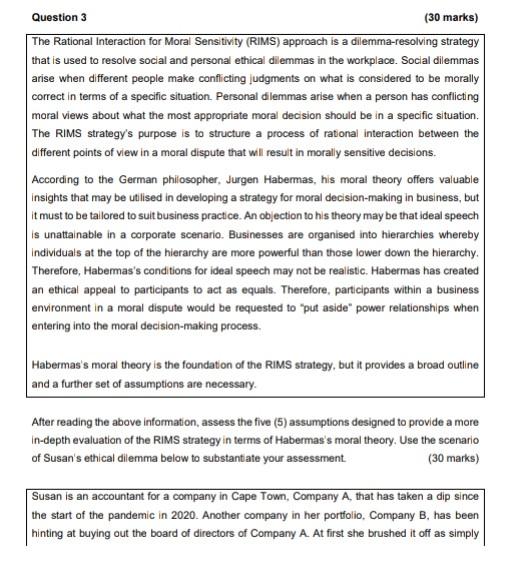Answered step by step
Verified Expert Solution
Question
1 Approved Answer
Ethics In accountancy Question 3 (30 marks) The Rational Interaction for Moral Sensitivity (RIMS) approach is a dilemma-resolving strategy that is used to resolve social
Ethics In accountancy

Question 3 (30 marks) The Rational Interaction for Moral Sensitivity (RIMS) approach is a dilemma-resolving strategy that is used to resolve social and personal ethical dilemmas in the workplace. Social dilemmas arise when different people make conflicting Judgments on what is considered to be morally correct in terms of a specific situation Personal dilemmas arise when a person has conflicting moral views about what the most appropriate moral decision should be in a specific situation. The RIMS Strategy's purpose is to structure a process of rational interaction between the different points of view in a moral dispute that will result in morally sensitive decisions. According to the German philosopher, Jurgen Habermas, his moral theory offers valuable insights that may be utilised in developing a strategy for moral decision-making in business, but It must to be tallored to suit business practice. An objection to his theory may be that ideal speech is unattainable in a corporate scenario. Businesses are organised into hierarchies whereby Individuals at the top of the hierarchy are more powerful than those lower down the hierarchy. Therefore, Habermas's conditions for ideal speech may not be realistic. Habermas has created an ethical appeal to participants to act as equals. Therefore, participants within a business environment in a moral dispute would be requested to put aside power relationships when entering into the moral decision-making process. Habermas's moral theory is the foundation of the RIMS strategy, but it provides a broad outline and a further set of assumptions are necessary. After reading the above information, assess the five (5) assumptions designed to provide a more in-depth evaluation of the RIMS strategy in terms of Habermas's moral theory. Use the scenario of Susan's ethical dilemma below to substantiate your assessment (30 marks) Susan is an accountant for a company in Cape Town, Company A, that has taken a dip since the start of the pandemic in 2020. Another company in her portfolio Company B, has been hinting at buying out the board of directors of Company A. At first she brushed it off as simply
Step by Step Solution
There are 3 Steps involved in it
Step: 1

Get Instant Access to Expert-Tailored Solutions
See step-by-step solutions with expert insights and AI powered tools for academic success
Step: 2

Step: 3

Ace Your Homework with AI
Get the answers you need in no time with our AI-driven, step-by-step assistance
Get Started


